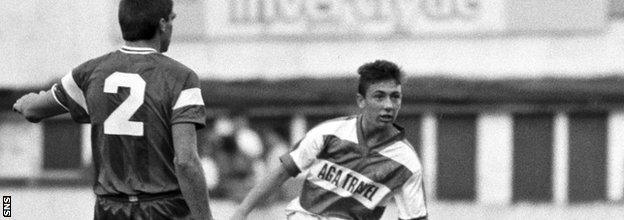Neil Lennon & Derek McInnes rebut sponsorship gambling claim
- Published
Derek McInnes, Neil Lennon and Gary Holt talk gambling in football
Neil Lennon and Derek McInnes have both denied claims that the involvement of betting companies in Scottish football exacerbates issues with gambling.
Hamilton Academical head coach Brian Rice faces Scottish FA charges after a relapse in his gambling addiction.
Betting firms sponsor the three main men's competitions in Scotland, but the managers of Celtic and Aberdeen do not think that in itself causes problems.
"You can't tarnish betting companies with this situation," Lennon said.
"We know that some players can get carried away, but it is not just football - it's all sports and all walks of life. For some people, it is an addiction.
"I think the betting companies do put a lot into the game for the right reasons and they do have restrictions at times on the amount people can use."
Aberdeen counterpart McInnes echoed those sentiments, with both men also voicing their sympathy and support for Rice.
"Sometimes you have to wrestle with your morals a wee bit," he said. "I think, as individuals, we're still able to make decisions whether you have a bet or not, regardless of who the sponsor is.
"I can see the contradiction, but we're grateful for any sort of sponsorship money."
As well as the three title sponsorship deals - which expire this summer - Scottish football also has clubs with betting companies as shirt sponsors, something that could reportedly be banned, external as part of a reviewing the 2005 Gambling Act committed to by the UK government.
'We'd all lump it on' - how has football changed?
One anonymous Scottish Professional Football League player told BBC Scotland that players "in pretty much every dressing room" bet on matches, despite the risk of punishment.
Players in Scotland are not allowed to gamble on any match in any country, but some even bet on themselves to get booked, says the player.
Both Celtic manager Lennon and Aberdeen counterpart McInnes said they did not think it happened in their clubs, but the Northern Irishman spoke about how he "liked a wee bet back in the day".

Derek McInnes says he would regular gamble during his playing career with the likes of Morton
McInnes, meanwhile, said gambling was used during his playing career to boost win bonuses.
"I was brought up in dressing rooms where we would bet on ourselves," he said. "We'd get the coupon in and say we were five-to-one to win, we'd all lump it on.
"Even later in my career, before the rules became a lot stricter, you'd have a two-or-three-team accumulator to win a wee bit of extra money.
"Dressing rooms were always full of chatter after a game about who won and who didn't, and how much money was won, but I genuinely don't see that now.
"It may still be relevant in lower leagues, where the boys are not earning the same amount of money, but I don't think it is as bad as when I played."
'We are too keen to hammer people' - is education needed?
Support to deal with gambling is offered by PFA Scotland, which also meets with players during the season to remind them of the Scottish FA rules around betting.
Livingston manager Gary Holt said his club also hold their own talks with players "to educate them" but that "sometimes it's not enough".
"It's an addiction and an illness, so no matter how much you talk to them or help them, sometimes they still do it," he said.
"There is every avenue possible for you to put a bet on. It's part of society. People bet on football or horses or the lottery. For the Grand National, there are sweepstakes in every workplace in Britain.
"It's not about punishment. It's about picking up the pieces from it and educating them again about what to do when they get that urge.
"We are sometimes too keen - especially in football if it's a high-profile person - to hammer them if they are in the wrong. But how can we make it better rather than kicking someone when they are down?"